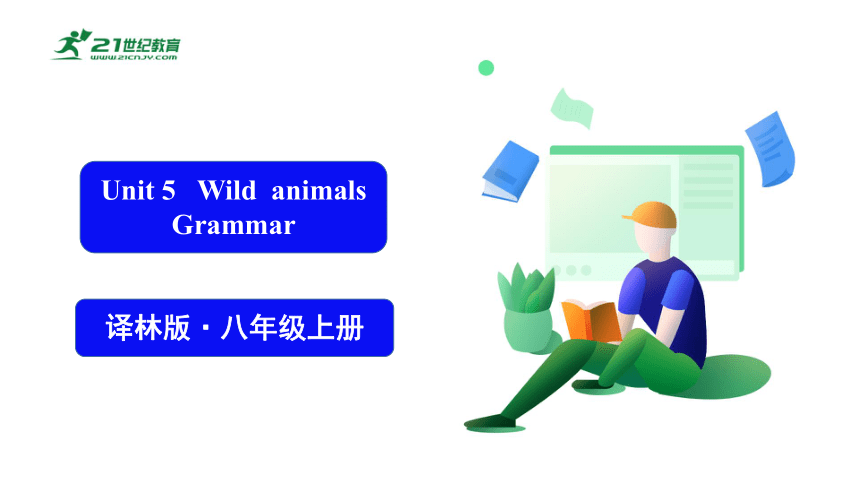(
课件网) 译林版·八年级上册 Unit 5 Wild animals Grammar 1.学习本课节生词和短语:closed, bat, bee, lost, save, get lost, the same…as 3.了解更多有关野生动物的信息。 2.掌握情态动词may表示推测的用法; 掌握动词不定式作宾语的用法。 学习目标 1. Why do people call the panda “Xi Wang” 2. What will happen to the pandas if the bamboo forests disappear They may hope it will bring them a hope. Pandas may not have a place to live or food to eat. Revision May I help you sir We use may to say that something is possible. A Using may for possibility 1. 用情态动词may 表示肯定推测,译为“可能,也许”,通常只用于肯定句与否定句中,相当于perhaps, possibly 或maybe。 一、情态动词may的用法 may not :可能不,表示否定推测 eg:The news may or may not be true. 这消息也许是真的,也许不是真的. 但是, may 不是唯一的表示可能性的情态动词,如图所示: 语气 弱 中 强 (100%) 肯定推测 might may must (一定) 否定推测 might not may not (可能不) can not (不可能) 提示:can 不能表示肯定推测,mustn't 不能表示否定推测,而表示“不准,禁止”。 比较: 他明天可能会回来。 He might/ may come back tomorrow. (√ ) He can come back tomorrow. (×) 那不可能是李老师。 It can't be Mr. Li. (√ ) It mustn't be Mr. Li. (×) 2. may 除了可以表示推测,还可以表示请求,许可,允许,通常用于疑问句中。 eg:—May I go now 我现在可以走了吗? —Yes, you can. / No, you can't. 回答时不可用may, might,或could及其否定形式 3. 表示必须,必要。must 和have to 在陈述句中,must强调说话者的主观想法, have to强调客观需要,意为“不得不”。 在疑问句中,回答must引出的问句时,肯定回答用must, 否定回答可以用needn't或don't have to(不必),一定不能使用mustn't(禁止,不准)。 eg:—Must I finish my homework now 我现在一定要完成作业吗? —Yes, you must. / No, you needn't/don't have to. 是的,一定要。/不,没必要。 Complete what Millie says using may with the words in brackets. The elephant is going towards the water. It _____(need) a bath. The little boy is crying because he saw the tigers. He _____(be) afraid of them. I cannot go near the lions and tigers. They _____(hurt) me. The baby panda is not drinking its mums milk. It _____(not be) hungry. The monkeys are jumping around. They _____(be playing) with each other. The horse is standing with its eyes closed. It _____(be sleeping). may be may hurt may not be may be playing may be sleeping may need B Using verbs + to-infinitives We often use to-infinitives after these verbs. agree begin decide fail forget hope learn plan prepare remember try want 动词不定式结构 Linda wanted to visit the park. Sandy needs to go with them. Millie decided to stay at home. 上面例子中主要行为动词后面的动词都采用了“to + 动词原形”的结构,我们把这种结构称为动词不定式(有时可以不带to)。动词不定式没有人称和数的变化,不受主语和谓语动词时态变化的影响。在句子中不能单独作谓语。 我们通常在以下词后面用动词不定式结构 learn plan prepare want like start begin fail forget to do sth. 忘记去做某事(事情未做) eg:Don't forget to lock the door when you go out. 当你出去 ... ...

